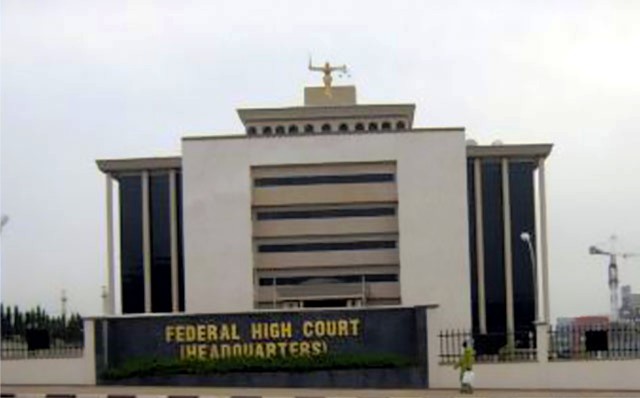Editorial
Attack On Temple Of Justice

Like many other acts of infamy that took place in 2019, the December 6 frenzied scene at the Federal High Court, Abuja, adds no value to the image of Nigeria. Although the eventual release of the political activist and #RevolutionNow convener, Omoyele Sowore, after the ugly episode, may have healed the wounds of the immediate victims, the emotional trauma of the infamy on the temple of justice and its long term effects on Nigeria’s image can not be easily assuaged.
The pseudo event that the Department of State Services (DSS) turned into a storm was no plus for the country. It rather did the nation a great infamy as well as questioned its democratic credentials and independence of its Judiciary.
The invasion of the Federal High Court, Abuja, by the DSS operatives for the purpose of re-arresting Sowore inside the courtroom, barely 24 hours after his release on court orders, was one ugly episode too many. It was barbaric, bestial and absurd. It is tantamount to an assault on the temple of justice.
Like The Nation’s Editorial Board Chairman, Sam Omatseye, succinctly captured it, “The Sowore saga shows a state in search of a sage. They (the DSS) set up a stage, filled it with a cast so peculiar and they treated us to a theatre of the absurd. It first seemed improbable, then, it was a laugh, then a farce and now it is unveiling what seems like the beginnings of a tragedy”.
What transpired at the Justice Ijeoma Ojukwu’s courtroom on December 6 was such an ugly scene that even the Chairman of the Presidential Advisory Committee Against Corruption (PACAC) and one of Buhari’s strongest defenders, Prof. Itse Sagay (SAN) chided the DSS for its bestial act. Also, the government’s own watchdog, the National Human Rights Commission (NHRC) called on the Muhammadu Buhari government to respect the court orders.
The DSS’ explanation that Sowore “resorted to acts inimical to security” shortly after being released from custody on December 5, without substantiating how he constituted security threat to the nation cannot fly. Did Sowore commit another offence after his release? Or is it the same offence for which Sowore was granted bail? Whatever it is, the DSS owes Nigerians an explanation for invading the premises of a court which is meant to be a sanctuary.
Although, the DSS spokesman, Dr. Peter Afunanya, put up a denial that the service invaded the courtroom, causing Justice Ojukwu to flee, the video clip of the unfortunate incident put a lie to the denial.
We recall a similar assault on the judiciary in 2016 when the official residences of some judges were invaded at night by DSS operatives. Till date, no official of the service has been questioned or queried let alone sanctioned for that infamous act.
It is unimaginable that in a democracy, the security arm of the government would thumb its nose at the rule of law and desecrate the temple of justice with such a hectoring impunity. Did the DSS know they were operating from the premise of a democracy? Or did they think they are above the law?
It is against this backdrop that we call for the probe of the DSS invasion of the Abuja high court with a view to meting out necessary sanctions against erring officials of the service. Nigeria cannot pretend to be operating a pluralist democracy when those who are supposed to protect it are playing haughty.
We also implore President Buhari to rein in his men and stop them from causing his government further embarrassment. The President should not wait for public uproar to act or allow his overzealous security agents to turn public sentiments against his government.
Already, many eminent Nigerians, including the Nobel Laureate, Professor Wole Soyinka, and a national newspaper, The Punch, have demonised the President as a General and his administration a regime for allowing a military-style impunity to reign in a democracy. This is not a good credential for the Buhari administration.
By now, Nigeria ought to have moved away from the dictatorial spell of the military era when the rule of law was on complete suspension. The country now operates democracy, so, democratic tenets must triumph.
While The Tide applauds the Buhari administration’s apparent new resolve to obey court orders that were hitherto spurned, we expect that the release on bail of Sowore and former National Security Adviser (NSA), Sambo Dasuki, from prolonged detention would signpost the beginning of a new regime where the rule of law, due process and orderliness will thrive and triumph.
One way to convince Nigerians of its new disposition is for the Buhari government to comply with all outstanding orders of the court and make it its standard trait, henceforth. No society prospers through lawlessness.
Editorial
Beginning A New Dawn At RSNC

Editorial
Sustaining OBALGA’s Ban On Street Trading

Editorial
AFCON ’25: Bravo, Super Eagles, But…

-

 Politics5 days ago
Politics5 days agoAPC Releases Adjusted Timetable For Nationwide Congresses, Convention
-

 Sports1 day ago
Sports1 day ago2026 WC: Nigeria, DR Congo Awaits FIFA Verdict Today
-
Sports4 days ago
DG NIS Wants NSC Board Constituted, Seeks Increased In Funding
-

 Business4 days ago
Business4 days agoCustoms Seek Support To Curb Smuggling In Ogun
-

 Featured4 days ago
Featured4 days agoINEC Proposes N873.78bn For 2027 Elections, N171bn For 2026 Operations
-

 Sports4 days ago
Sports4 days agoSWAN Rivers Set-up Five Functional Committees
-
Sports4 days ago
NSC Disburses N200m Training Grants To 26 Athletes
-
Sports4 days ago
‘NTF Will Build On Davis Cup Success For Brighter Future’

